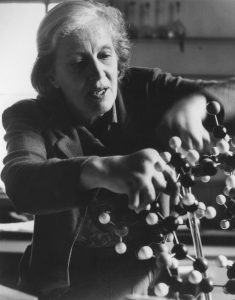“A rare talent and a role model” – Somerville’s Principal nominates our Nobel Prize winner for the new note.
The Bank of England has asked for nominations of great and worthy scientists to be the face of the new £50 note. Somerville is very proud to claim a number of contenders, not least its namesake, Mary Somerville, the woman for whom the term ‘scientist’ was coined. Margaret Thatcher’s name has also been put forward; it is perhaps not widely known that Thatcher was far more gratified by being the first scientist to become Prime Minister than by being the first woman.
There is another excellent Somerville name, however, that to my great surprise is not resounding as loudly as one would expect: Professor Dorothy Crowfoot Hodgkin, who for more than half a century has remained the only British woman to have won a Nobel Prize for science.
In the scientific community, she is known as the founder of protein crystallography, a method of using x-rays to ‘see’ the structures of protein molecules. Her research was ground-breaking at the time, earning her the title of not only founder, but pioneer.
Hodgkin’s genius was to embrace new ideas and develop new techniques for each challenge. She was the first to solve the structures of important and increasingly complex molecules including cholesterol, penicillin and vitamin B-12, eventually resulting in the Nobel Prize.
Yet Hodgkin’s much-deserved recognition for her contributions to science was slow to materialise. Max Perutz, who had received the Nobel Prize for Chemistry two years before Hodgkin for his work on the structure of haemoglobin, said: “I felt embarrassed when I was awarded the Nobel Prize before Dorothy, whose great discoveries had been made with such fantastic skill and chemical insight and had preceded my own.”
Headlines at the time read ‘Oxford housewife wins Nobel Prize,’ and ‘Nobel prize for a wife from Oxford,’ focusing on her duties as a wife and mother of three rather than her role as a Professor at Oxford and a visionary and deeply revered research scientist.
Dorothy Hodgkin’s name recognition continues today to be hugely disproportionate to her importance to science, medicine and structural biology – the latter of which she helped to pioneer. Her life’s work was discovering the structure of insulin in 1969. The solution was the culmination of 34 years of research, and paved the way for the manufacture of synthetic insulin. She became the second woman (after Florence Nightingale) to receive the Order of Merit in 1965. She is also the only woman to receive the Royal Society’s Copley Medal.
Alongside these extraordinary achievements, she also campaigned tirelessly for world peace, nuclear disarmament and international scientific cooperation. She was widely admired for her dedicated mentoring and support of younger talent. She warmly welcomed international students, and she fostered connections with labs in China and India, promoting collaborative research.
Hodgkin challenged the practice of withdrawing research funding for graduate women who decided to marry. She donated a portion of her Nobel Prize winnings to provide on-site childcare at Somerville, now the Somerville Nursery, which continues to be one of the few provisions of its kind in Oxford.
It is also eye opening that throughout most of her life, Hodgkin was in significant physical pain. She was diagnosed with rheumatoid arthritis at the age of just 24. She would go on to lose much of the function in her feet and hands, forcing her to rely increasingly on a wheelchair. These disabilities did little to prevent her from continuing her research, including creating beautifully intricate drawings and models of the molecules she envisaged, despite her limited hand function and constant pain.
If the Bank of England are seeking a great mind, a rare talent, an exceptional leader, and an impeccable role model, I can think of no scientist and example more brilliant and yet more overlooked. I am extremely proud to nominate Dorothy Crowfoot Hodgkin to appear on the new £50 note.
